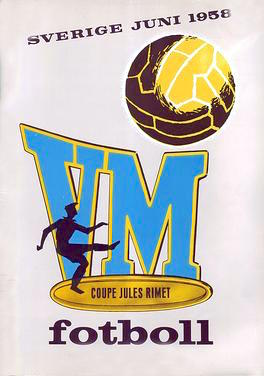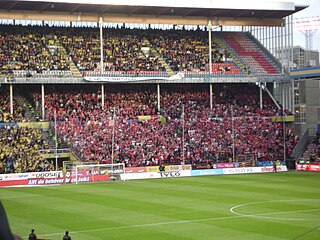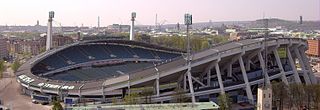
The 1958 FIFA World Cup was the 6th FIFA World Cup, a quadrennial football tournament for men's senior national teams. It was played in Sweden from 8 to 29 June 1958. It was the first and only FIFA World Cup to be played in a Nordic country.

The 1992 UEFA European Football Championship was hosted by Sweden between 10 and 26 June 1992. It was the ninth UEFA European Championship, which is held every four years and supported by UEFA.
The 1982 season in Swedish football, starting January 1982 and ending December 1982:
The 1983 season in Swedish football, starting January 1983 and ending December 1983:
Standings and results for Group F of the UEFA Euro 2008 qualifying tournament.
The 1989 season in Swedish football, starting January 1989 and ending December 1989:

The Denmark–Sweden football rivalry is a highly competitive sports rivalry that exists between the national men's football teams of Denmark and Sweden. The clashes between the two neighbouring countries has since the very first match in 1913 attracted large crowds that have witnessed several spectacular games and controversial incidents, despite the fact that the two teams very seldom have met in any of the larger international football tournaments. Sweden leads the series 46–20–43.

The UEFA Euro 1992 final was the final match of UEFA Euro 1992, the ninth European Championship, UEFA's top football competition for national teams. The match was played at the Nya Ullevi in Gothenburg, Sweden, on 26 June 1992, and was contested between Denmark and Germany. Denmark reached the final despite officially qualifying for the tournament ten days before it commenced, following Yugoslavia's ejection by UEFA as a result of the breakup of the country.
Standings and results for Group 5 of the UEFA Euro 1984 qualifying tournament.
The 2009 season in Swedish football, starting January 2009 and ending December 2009:
The 2010 season in Swedish football, started January 2010 and ended December 2010:
The 2011 season in Swedish football, started in January 2011 and ended in December 2011.
The 2012 season in Swedish football, started in January 2012 and ended in December 2012.
The UEFA European Championship is one of the major competitive international football tournaments, first played in 1960. The finals stage of the tournament takes place every four years, with a qualifying competition beforehand. The sixteenth tournament was held across Europe in 2021.
The UEFA European Championship is the main football competition of the men's national football teams governed by UEFA. Held every four years since 1960, in the even-numbered year between World Cup tournaments, it was originally called the UEFA European Nations' Cup, changing to the current name in 1968. Starting with the 1996 tournament, specific championships are often referred to in the form "Euro 2008" or whichever year is appropriate. Prior to entering the tournament all teams other than the host nations compete in a qualifying process.
The Denmark national football team have participated in ten UEFA European Championships, and won the tournament once. Their first tournament was the 1964 edition, in which they secured fourth place. In the final of UEFA Euro 1992 in Sweden, Denmark's 2–0 victory over Germany resulted in their first major tournament title.
The UEFA European Championship is one of the major competitive international football tournaments, first played in 1960, whose finals stage has been held every four years, with the sixteenth staging of the competition occurring in 2021.
Group 3 of the UEFA Euro 1976 qualifying tournament was one of the eight groups to decide which teams would qualify for the UEFA Euro 1976 finals tournament. Group 3 consisted of four teams: Yugoslavia, Northern Ireland, Sweden, and Norway, where they played against each other home-and-away in a round-robin format. The group winners were Yugoslavia, who finished four points above Northern Ireland.
Group 2 of the UEFA Euro 1968 qualifying tournament was one of the eight groups to decide which teams would qualify for the UEFA Euro 1968 finals tournament. Group 2 consisted of four teams: Bulgaria, Portugal, Sweden, and Norway, where they played against each other home-and-away in a round-robin format. The group winners were Bulgaria, who finished 4 points above Portugal.
The Scania 100 Tournament was a minor international men's football tournament organised by Swedish Football Association. It was held in Sweden, from 12 to 16 June 1991. It served both as a warm up tournament one year prior to the Euro 1992 and as a commemoration of the 100th anniversary of Scania.









